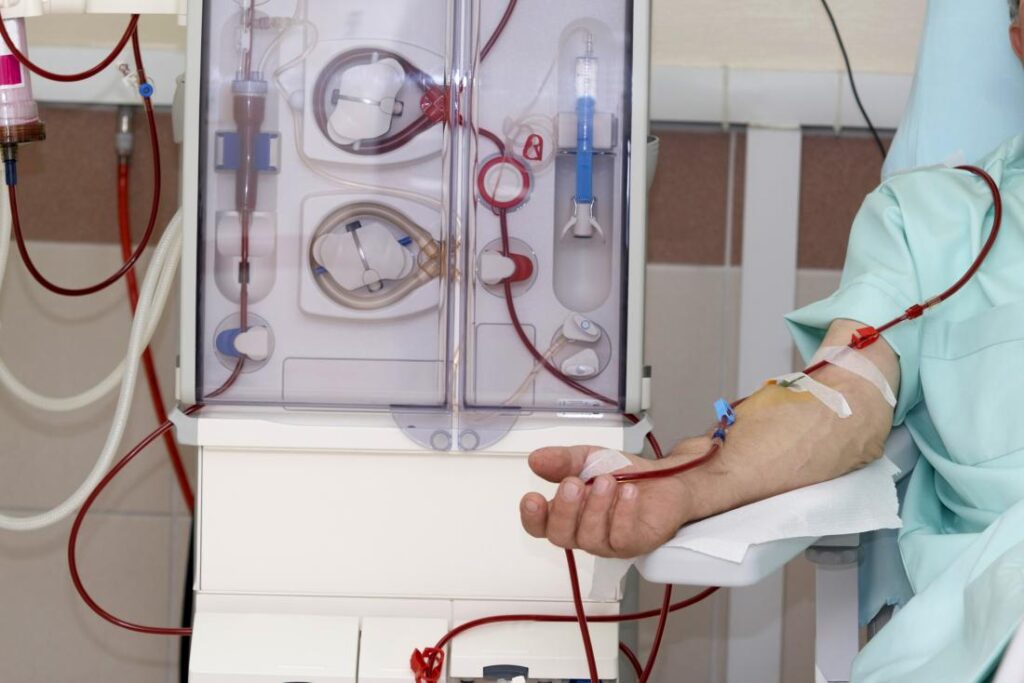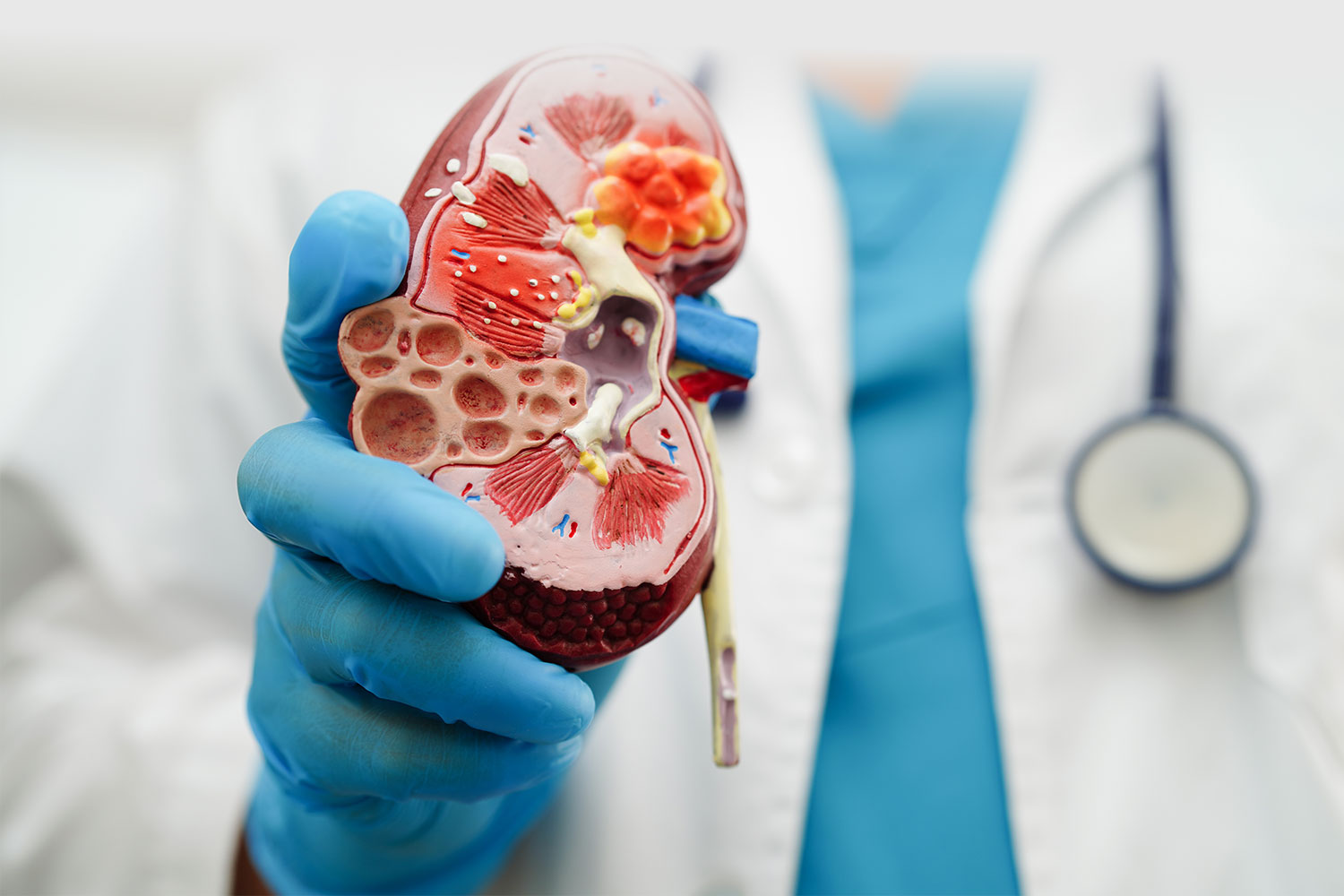What is Chronic Kidney Disease
Chronic Kidney Disease is not a supervillain who is here to get us all one at a time. It is a tricky culprit who stealthily targets each one of us via different paths to destruction. The degree and the length or time of Chronic Kidney Disease is what differs from person to person. At the beginning, there are probably several signs that are not clear and there may be no obvious things to alert the outside world. This CKD is a sneaking enemy; the one who furtively attacks, yes, when you are not aware that the war has just started.
But fear not! When you understand Chronic Kidney Disease, its clever strategies and the possible heroes involved (it’s you and yours healthcare team), you will take control of your kidney disease and make yourself the fighting disease. This trip to the world of CKD will help you to acquire the knowledge by means of which you will be able to fight the evil at your door step. Therefore we need to be patiently prepared and take the first lesson forward.
Causes of Chronic Kidney Disease
Chronic kidney disease is caused by many factors, some of them are describes below;
Hypertension

It is similar to a phantom that always follows the SoC to the final outcome of the CKD drama. Inherent to its chronic course, aggravating the structural integrity of kidney with constant raised blood pressure, hindering the blood flow to it, and launching a sequence of inflammatory reactions. If left uncontrolled, this consistent onslaught offers the conditions necessary for then fibrosis and ultimately permanent scarring to unfold, the last step in this progression being the onset of CKD which only emphasizes the critical role of blood pressure management to prevent the disease.
Diabetes Mellitus
Unraveled in the horizon, CKD unfolds as an insidious downfall after the mercurial metabolic morass initiated by hyperglycemia enshrouds the world in the current epidemic of diabetes mellitus. Interestingly, elevation of blood glucose causes such a systemic hazard which means that oxidative state, inflammation and endothelial dysfunction become more common in the renal microvasculature. The result? A deadly cycle of injury, tubulointerstitial fibrosis, and a decreasing of renal function itself, thus demonstrating an imperative of glycemic control over arresting this illness.
Genetic Predispositions for Chronic Kidney Disease
What transcends personal preferences and embraces the arcane of genetics, the mysterious orchestration of CKD is evoked by the profound influence of molecular compositions. While screenings for rare monogenic disorders such as polycystic kidney disease may not be readily available, populations may have common polymorphisms that may decrease or increase kidney health. Each of these genetic mysteries reveals their own specific direction towards individualized approaches, accurate targeting and individualized prevention by hook and by crook.
Environmental Exposures
In the toxic surround of industrialization and urbanization both of which are today’s modern milieu, the environment emerges as a subtlety hatched villain for kidneys’ health.
Several substances can damage the kidneys and potentially lead to the need for dialysis. These include:
- Heavy metals: Lead and cadmium are well-known examples.
- Osmotic agents: These can disrupt the body’s fluid balance and strain the kidneys.
- Nephrotoxic drugs: Nonsteroidal anti-inflammatory drugs (NSAIDs) and contrast media used in some imaging procedures can be toxic to the kidneys, especially with high or prolonged use.
With exposure and implementing strategies to eliminate all kidney environment dangers we can lead people to the future renal health.
Pathophysiology of Chronic Kidney Disease
The etiology of chronic kidney disease (CKD) lies under a multitude of layers of cellular dynamics within the Nephron, the fundamental functional unit of the kidney. There is a descending cycle of pathological processes starting with the disorders of the glomerulus where the intraglomerular pressure is increased and the functioning pattern of the glomerulus itself becomes altered. The injuries inflicted are consistent overlaps for the onset of a fibrosis espoused and coordinated by oxidative stress and inflammation that interferes and impairs normal tubular function.
Simultaneously, vascular abnormalities such endothelial dysfunction and microvascular rarefaction are aggravating ischemic tissue injuries by the means of continuing kidney ischemia. Immune dysregulation only helps to complicate, as inflammatory mediators and immune cells agonize further to pass the torches of fibrogenesis, pushing cists to a progressively advanced stage. Whatever these complex pathophysiological pathways might be, they dictate the direction of therapy and whether it can avoid, stop or hold the renal dysfunction decline.
Signs and Symptoms of Chronic Kidney Disease
Chronic kidney disease( CKD) usually is not manifested by obvious signs and symptoms, its presence disguised by a complicated picture of asymptomatic signs which gives way to the development of the disease. It is important that noticing these early signs enable for prompt treatment and handling of patients. Let’s delve into the diverse manifestations that may herald the presence of CKD;
Fatigue and Weakness
Chronic Kidney Disease (CKD) usually begins with a chronic tiredness and lack of energy manifested as an ongoing feeling of fatigue and weakness. With kidney function worsening, toxins and wastes tend to be left unfiltered in the bloodstream. This contribute to malaise, lowered appetite, and general fatigue in affected patients.
Swelling and Fluid Retention in Chronic Kidney Disease
Edema, a hallmark symptom of nephrotic syndrome, commonly affects the ankles, feet, and hands in people with chronic kidney disease (CKD). This widespread swelling signifies the impaired ability of the kidneys to maintain proper fluid balance, leading to fluid accumulation throughout the body.
Changes in Urination Patterns
Chronic kidney disease (CKD) can manifest through abnormal urination patterns. This may include:
- Increased urination frequency: This can be especially noticeable at night (nocturia).
- Foamy or bubbly urine: This is caused by excess protein in the urine.
- Changes in urine color or consistency: The urine may appear darker, more concentrated, or bloody.
Shortness of Breath
With a developing kidney disease, the fluid accumulation in lungs (pulmonary edema) can provoke breathing difficulty or breathing shortness, mostly, especially, during physical strain or laying tangled up.
High Blood Pressure
Having hypertension, i.e. high blood pressure which is also a risk factor for CKD, generates another challenge for patients with the latter. Kidney damage often leads to high blood pressure, and in turn this high blood pressure can then make the kidney problems worse, thus giving the cycle a vicious nature.
Nausea and Vomiting
GI symptoms of CKD may be accompanied by nausea and vomiting. They may also be followed by loss of appetite. They may manifest as a result of the clogging of body’s waste products in the bloodstream or due to the collapse in the levels of electrolytes and minerals within the body.
Itching and Skin Rash
Such as pruritus, or itch, is a frequent accusation of the CKD patients. The deposition of uremic toxins in the bloodstream could make your skin irritation to a point that ends up in itching sensation, just as your skin sometimes turn dry. This is referred as a skin rash.
Muscle Cramps and Twitching
From CKD patients, imbalanced electrolytes, specifically potassium (hyperkalemia) that has symptoms like cramps, twitch, or weakness may be experienced.
Cognitive Impairment
Even in the situation of severe-stage CKD, the cognitive function can be impaired, which might interfere with concentration, memorization, confusion, or even delirium.
Easy Bruising and Bleeding
CKD can alter the ability to clot thick blood and to form platelets which can create these undesired effects, such as bleeding from minor injuries and having bruises can last for a long time.
It is crucial to know such indications along with the illness to have early intervention in chronic kidney disease. Symptomatic manifestation like headache, vomiting or dizziness should be immediately consulted with a doctor to delve to the actual cause of the problem.
Diagnosis of Chronic Kidney Disease
Diagnosing chronic kidney disease (CKD) requires doctors to piece together a complex puzzle by considering various factors that reflect a wide range of kidney function.
Let’s embark on a journey through the diagnostic landscape of CKD, unraveling the key criteria that illuminate its presence;
Estimated Glomerular Filtration Rate (eGFR)
Estimated glomerular filtration rate (eGFR) is a key tool in diagnosing chronic kidney disease (CKD). It provides a statistical estimate based on serum creatinine levels, age, gender, and other factors. CKD stages are based on eGFR consistently below 60 mL/min/1.73 m² for at least 3 months.
Urine Albumin-to-Creatinine Ratio (ACR)
ACR means assay of urinary protein excretion, which helps diagnosing kidney damage and also tells about the progression from CKD towards end stage renal failure. An ACR that is over 30 mg/g (milligram per gram) continuously maintained for at least three months is a sign or albuminuria, usually one of CKD.
Imaging Studies for Chronic Kidney Disease
-
Ultrasound: This is a widely used, safe, and relatively inexpensive imaging technique that uses sound waves to create an image of the kidneys. It can reveal abnormalities in size, shape, or blood flow within the kidneys.
-
Computed Tomography (CT) Scan: A CT scan uses X-rays to create detailed cross-sectional images of the kidneys. It can provide a more precise view of the kidneys’ structure and may also be used with a contrast dye to assess blood flow.
-
Magnetic Resonance Imaging (MRI): MRI uses strong magnetic fields and radio waves to produce detailed images of the kidneys and surrounding organs. It can be particularly helpful in detecting abnormalities like cysts, tumors, or blockages in the urinary tract.
Beyond Functionality:
While these imaging techniques assess the overall function and appearance of the kidneys, they are also valuable in detecting other potential issues:
- Cysts and tumors: These can appear as abnormal masses on ultrasound, CT, or MRI scans.
- Renal parenchymal disease: This refers to damage or disease within the functional tissue of the kidneys. Imaging can reveal changes in the size or texture of the renal parenchyma.
Kidney Biopsy
A kidney biopsy may sometimes be necessary to confirm a diagnosis of CKD and determine the underlying cause, especially when:
- Clinical and diagnostic tests are inconclusive: If initial tests don’t provide enough information for a clear diagnosis.
- Glomerular diseases are suspected: This refers to specific kidney diseases that affect the glomeruli, which are tiny filters in the kidneys.
Clinical Evaluation of Chronic Kidney Disease
To make a clinical diagnosis of chronic kidney disease (CKD), clinicians conduct a systematic clinical evaluation that includes:
- A detailed medical history: This allows the clinician to understand any potential risk factors for CKD.
- A comprehensive physical examination: This helps identify any physical signs that might suggest CKD.
- Evaluation of clinical signs and symptoms: Clinicians will assess for symptoms commonly associated with CKD, such as fatigue, high blood pressure, or blood in the urine.
Evaluation of Underlying Causes
It is vital to identify the particular causes of the CKD and result in a better management plan of the patient and, by that, a better prognosis. The usual forms of condition are diabetic mellitus hypertension glomerulonephritis polycystic kidney disease and autoimmune disorders.
Assessment of Complications
CKD also causes people to seem to be at a high risk of other health complications such as cardiovascular disease, anemia, mineral and bone disorders plus electrolyte imbalances. Managing these comorbidities while dealing with the challenges of CKD is cardinal in the complete handling of chronic kidney disease.
Monitoring Disease Progression
To note, must always be routine check up of kidney function, urine protein excretion, blood pressure and metabolic parameters for them to track the disease progression, provide treatment management and get the needed positive outcomes in patients in due time.
Moreover, healthcare providers, by recognizing and applying these diagnostic criteria, may assemble the puzzle of chronic kidney disease, that would lead to timely detection, treatments directed at the patient’s problems, and ongoing monitoring, which is necessary for each individual. Early professional medical advice is your best bet for maintaining good kidney and overall health, even before a CKD diagnosis or risk factors arise.
Classification of Chronic Kidney Disease
Chronic kidney disease (CKD) embraces a variety of disorders that have a broad range of different causes departing from the clinical manifestations, and the management aspect. From common culprits like diabetes and hypertension to rare genetic disorders and autoimmune conditions, let’s embark on a journey through the multifaceted landscape of CKD types;
Diabetic Nephropathy
The CKD, one of the serious pathological processes causing a great number of death all over the world, is represented by diabetic nephropathy as its hallmark complication. Chronic high blood sugar is the culprit as it damages the very thin structures of kidneys causing glomerulosclerosis, proteinuria thus leading to progressive loss of renal function.
Hypertensive Nephropathy
The chronic hypertension, or high blood pressure, is maintained by the renal vessels. This causes hypertensive nephropathy as the effect of the continuous pressure exerted on the vasculature. Chronic hypertension develops a problem with the small blood vessels and nephrons within the kidneys that will cause progressive narrowing arterioles and eventually lead to reduction of blood flow to the kidneys. This will result to ischemic injury, glomerulosclerosis, and CKD.
Glomerular Diseases
Glomerular diseases encompass a family of conditions, which present with inflammation, damage or dysfunction of the glomeruli which is a filter unit of the kidney. This category includes disorders like FSGS/focal segmental glomerulosclerosis, membranous nephropathy, lupus nephritis, and so forth.
Polycystic Kidney Disease (PKD)
Polycystic kidney disease (PKD) causes multiple fluid-filled cysts to grow in the kidneys.
These cysts have an initial state of small dimension which continuously increases in size and results in disintegration of renal architecture and renal enlargement, end stress on all the organs of the body and the renal failure.
Chronic Interstitial Nephritis
Chronic interstitial nephritis is about inflammation and fibrosis of the renal interstitials which are the connecting tissues between nephrons. Many factors can cause CKD, including recurrent urinary infections, drug toxicity (like NSAIDs, antibiotics), autoimmune diseases, and environmental exposures. Gender isn’t a sole factor; men can get it too.
Obstructive Nephropathy
Obstructive nephropathy is defined as the mechanical blockage of the urinary tract causing the lapse of urine and stasis. These conditions that are accompanied by the blockage, end up impairing the organ, leading to kidney dysfunction. Various factors include kidney stones, benign turning, birth defects, and BPH, which is just a benign prostate hyperplasia.
Congenital and Genetic Disorders
A spectrum of congenital and genetical diseases exist which may be leading into CKD including CAKUT, Alport syndrome, nephronophthisis etc. These all are extremely rare syndromes affecting renal development and function.
Systemic Diseases with Renal Involvement
Systemic diseases like lupus erythematosus (SLE), vasculitis, amyloidosis, and sarcoidosis can trigger chronic kidney disease (CKD) through immune-mediated processes, vascular damage, or abnormal protein deposition in the kidneys.
Education of healthcare professionals about the various types of chronic kidney disease helps them target a unique type for diagnosis and management; thereby preventing further deterioration of the function of another kidney and improving the overall patients’ outcome. Early diagnosis, thorough assessment, and tailored interventions are crucial for surviving chronic kidney disease (CKD) by promoting good kidney health and well-being.
Complications of Chronic Kidney Disease
Chronic kidney disease (CKD) carries a multitude of issues, which is manifested by the fact that more and more organs if the kidneys are functionally impaired. From cardiovascular woes to metabolic disturbances, let’s delve into the multifaceted landscape of CKD complications;
Cardiovascular Complications
The CKD seems to be the major health risk factor for cardiovascular disease, which includes hypertension, ischemic heart disease, heart failure, and arrhythmias. Decreased efficiency of kidneys provides with disturbance in fluid and electrolyte levels, the endothelial function as well as increased acceleration of atherosclerosis, which might lead to myocardial infarction, stroke, and sudden cardiac deaths.
Anemia
Reduction of nephron number and the function of remaining ones lead to inadequate production of erythropoietin, the hormone vital to the process of red blood cell formation. Chronic kidney disease (CKD) often leads to anemia, a condition characterized by fatigue, weakness, shortness of breath (dyspnea), and pale skin (desaturation). This combination can significantly worsen cardiovascular health (additive burden) and reduce a person’s quality of life.
Mineral and Bone Disorders
CKD disturbs the specialized balance of minerals and hormones rather responsible for bone metabolism and so mineral and bone disorders (MBD). Such include various abnormalities in calcium, phosphorus, parathyroid hormone (PTH), as well as all forms of vitamin D metabolism, driving individuals into renal osteodystrophy, osteoporosis, and fractures.
Fluid and Electrolyte Imbalances
The incidence of renal dysfunction leads to renal failure affects the normal functioning of the kidney that plays a role in regulating the intravascular fluid, electrolyte balance which leads to fluid retention, hyponatremia, hyperkalemia, metabolic acidosis, and disturbances in serum calcium and phosphate levels. Such variations in the amounts of essential components can cause edema, high blood pressure, cardiac arrhythmias, muscle weakness, and neurological symptoms.
Uremic Syndrome
With the advancement of CKD, uremic toxins, wastes, build-up of uremic syndrome which may manifest as symptom complexes. These comprise not just nausea and vomiting, but anorexia, pruritus, cognitive impairment, peripheral neuropathy, and, a rare phenomenon of amassing of crystalline deposits over the skin called uremic frost.
Fluid Overload and Pulmonary Edema
The kidneys perform their regular functions of excreting body fluids impaired owning to this fact which can lead to fluid overload, resulting in the lungs lining with edema (swelling). A serious complication of pulmonary edema is characterized by symptoms of dyspnea, orthopnea, cough, and frothy sputum. Therefore, hastening the implementation of appropriate medical therapy is a key priority to maintain untroubled respiratory function and avert cardiovascular failure.
Metabolic Acidosis due to Chronic Kidney Disease
The functional withdrawal in intricate acid-base management during CKD resulting in metabolic acidosis disrupted bicarbonate levels in serum. Metabolic acidosis worsens CKD by weakening bones, muscles, and raising heart risks
Increased Risk of Infections
CKD is a disease that undermines the function of the immune system, causing individuals to be more likely to get infections. These include mainly those of urinary tract, pneumonia, skin, and soft tissue, and sepsis. Metabolite removal and exchange diminish in compromised kidneys thus hampering the immune system functioning. This makes patients more susceptible to infections.
CKD’s complexity lies in managing various factors. Targeted interventions by healthcare professionals improve patients’ quality of life and long-term outcomes. Prompt and comprehensive management, close dialogue with multidisciplinary care, and adhering closely to the guidelines for renal health are among the most important facts that every patient needs to understand and apply to successfully master the challenges that come with chronic kidney diseases.
Treatment options for Chronic Kidney Disease

Chronic kidney disease (CKD) treatment involves lifestyle changes, medication, and advanced interventions to slow kidney decline and manage disease effects. Let’s explore the diverse array of treatment options available to individuals navigating the challenges of CKD;
Lifestyle Modifications of Chronic Kidney Disease
Healthy habits (diet, exercise) slow CKD progression and improve kidney health.
- Balanced proportions: Healthcare providers recommend a well-balanced diet that includes proportioned amounts of fats, carbohydrates, proteins, vitamins, and minerals for CKD patients.
- Limited protein: Protein intake may need to be restricted to reduce strain on the kidneys. A healthcare professional can determine the appropriate amount of protein based on your individual needs.
- Limited weight gain: Managing weight is important for overall health, and may also be part of your CKD management plan.
Daily exercising and abstinence from smoking and alcohol are also vital in preventing kidney diseases
Blood Pressure Management
The key of CKD management is to regulate the hypertension which increases cardiovascular risk and damages the kidneys. To meet blood pressure targets and prevent worsening kidney damage, doctors often prescribe Antihypertensives. It includes angiotensin-converting enzyme inhibitors (ACEIs) and angiotensin II receptor blockers (ARBs).
Glycemic Control
To prevent further kidney decline and the development of diabetic nephropathy, healthcare providers may initiate ultra-tight glycemic control in patients with known diabetic mellitus and chronic kidney disease (CKD). This includes two main components. sticking to a diabetic diet, checking blood glucose level frequently and taking insulin (injected or oral hypoglycemic agents) as prescribed by a doctor.
Medication Management
Pharmacotherapy essentially lays out the ground work for preventing CKD complications and comorbidities that emerge from CKD. This prescription may embrace medications to treat anemia (erythropoiesis-stimulating agents, iron supplements) among others, medicines for the management of mineral and bone disorders (e.g., phosphate binders, vitamin D analogs), metabolic acidosis (sodium bicarbonate) or cardiovascular risk factors (e.g., statins, antiplatelet)
Renal Replacement Therapies
CKD reaches end stage when kidneys fail. Renal replacement therapy becomes the only option. Hemodialysis, peritoneal dialysis, and kidney transplantation are the three main types of renal replacement therapy (RRT). Each offers unique benefits but also has limitations that healthcare professionals consider when determining the most suitable option for each patient.
Symptom Management of Chronic Kidney Disease
Considering symptoms and quality of life, improving CKD management, is an integral part of CKD care. One of the possible methods is ensuring management of itching by applying topical remedies or phototherapy as well as relieving nausea and vomiting from antiemetics, other reducers of potassium, fluid overload with diuretics and providing support for pain, fatigue and other CKD symptoms and complications.
Patient Education and Support
Education, providing self-management methods, and psychological support to those with CKD would empower the individuals. Thus, they can make progress in existing treatment guidelines, become resilient and well-being in the future. Support groups, education, and counseling empower CKD patients to manage their condition.
Maintain a Healthy Lifestyle

The implementation of CKD prevention depends on living a healthy life that includes various life changes. Among things this is eating a balanced diet that consists of fresh produce, various cereals, and lean meal. Besides that, a healthy weight but also regular exercises and avoidance of tobacco smoking is essential. Also add minerals and vitamins in your diet for good nourishment.
Manage Chronic Conditions
Indeed, efficiently managing chronic diseases like DM II and HTN is considered as the main question addressing CKD. Strict control of meds, diet, exercise slows kidney damage in diabetes
Stay Hydrated
Sufficient water intake is key to healthy kidneys and, consequently, helps prevent kidney disease. Staying adequately hydrated throughout the day flushes toxins and waste products from the body. This helps prevent the formation of stones, which can irritate the urinary tract and lead to infections.
Monitor Medication Use
NSAIDs, some antibiotics, and contrast dyes can harm kidneys and cause CKD .Doctors watch meds, advise against NSAIDs to slow kidney damage.
Control Blood Sugar and Blood Pressure
People are highly obligated to make sure that they control and maintain their blood sugar and blood level required. For instance, this could incorporate the routine tracking, medication compliance, dietary adjustments, and lifestyle modifications. So the risk of CKD complications is reduced.
Get Regular Check-ups
Regular health screening and consultations are mainstay tools for identifying renal disease early and providing treatment as soon as possible. Early tests like blood pressure and urine checks help find kidney problems early.
Avoid Excessive Alcohol Consumption
Chronic overindulgence of alcoholic substances eventually diminish the performance of kidney and result in the condition of kidney disease. To lower the risk of alcohol-induced kidney damage, experts advise consuming alcohol at levels well below the national limits.
Manage Stress
Chronic stress disrupts blood pressure control, weakens functional immunity, and triggers inflammatory processes, paving the way towards kidney disease. Mindfulness, meditation, yoga and focused breathing may aid in stress reduction and hence, in overall wellness which protects kidney health.
Drug therapy and healthy lifestyle are the primary preventive strategies for renal wellness. Prevention plays an important role. We will take a multifaceted approach that considers lifestyle factors, type 2 diabetes, medication use, and stress management. These form the key areas on which the individual will be able to build a healthy kidney life.
Frequently sked Questions
Will I need dialysis?
Dialysis is a treatment that takes the job of filtering out waste when your kidneys fail. The good news is that many people with CKD can manage their condition for years without needing dialysis. Early diagnosis and effective management of underlying conditions such as diabetes and high blood pressure are key. Your doctor will check your kidney function and discuss treatment if necessary.
What can I eat with Chronic Kidney Disease?
Nutrition is important for the management of CKD. While some restrictions may be necessary, it doesn’t have to be slow! Focus on whole foods like fruits, vegetables and whole grains. You can restrict foods high in protein, phosphorus and potassium. A registered dietitian can help you create the right meal plan that tastes great and is kidney-friendly.
Can I still exercise with Chronic Kidney Disease?
exactly! Regular exercise is a great way to manage CKD and improve overall health. Exercise helps control blood pressure, increases energy and improves mood. Talk to your doctor about creating a safe and effective exercise program. Start slowly and gradually increase the intensity as you get comfortable.
What’s the latest research on CKD treatments?
The field of nephrology (kidney treatment) continues to grow. Researchers are looking for new drugs to slow the progression of CKD and improve quality of life. There is also ongoing research into kidney-regenerating drugs, which one day promise to repair kidney damage. Talk to your doctor for the latest information or search popular sites like the National Kidney Foundation website.
Remember, CKD is a manageable condition. By working with your doctor and adopting the right lifestyle changes, you can take control of your health and live a full life.













7 Comments